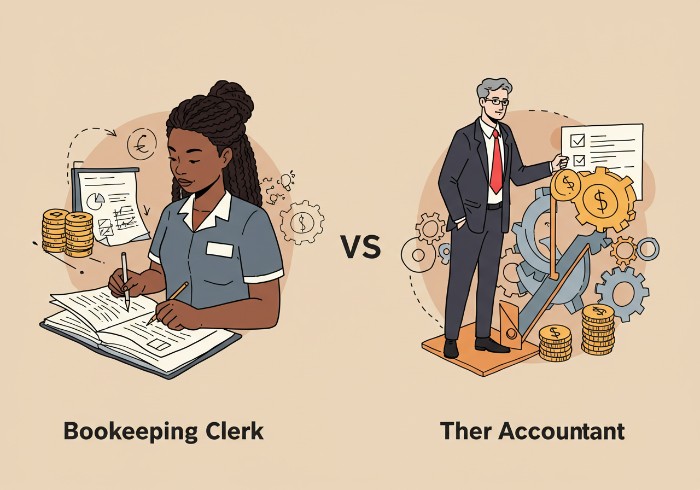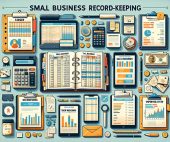
Bookkeeping Clerk vs Accountant
You’d be surprised how often I’ve had to clear this up—bookkeeping clerks and accountants are not the same thing. Not even close, if you ask me. And yet, I still get the occasional “So you’re like an accountant, right?” when I tell people what I do. (Cue the polite nod and internal sigh.)
The confusion makes sense, though. Both roles live in the same corner of the finance department, they both deal with numbers, and from the outside, it can look like just one big blur of spreadsheets and receipts. But here’s the thing: bookkeeping is about the daily grind—recording, categorizing, and keeping things neat. Accounting? That’s more about interpreting all that data and making higher-level decisions with it. Think: groundwork vs. strategy.
Back when I started (around the time when people still dropped off paper ledgers in person), the lines were even fuzzier. But today, with cloud-based systems and tighter financial compliance rules, the difference has only become more important—especially if you’re thinking about your career path.
So in this piece, we’re going to break down the real difference between an accountant and a bookkeeping clerk—in plain English. No jargon. Just what you need to know to tell them apart, whether you’re hiring, job hunting, or just trying to make sense of your finance team.
Let’s dive into the details—because this mix-up? It’s time we cleared it up for good.
What Is a Bookkeeping Clerk?
If you’ve ever walked into a small business office early in the morning and heard the soft tap-tap-tap of someone entering transactions before the coffee’s even brewed—chances are, that’s your bookkeeping clerk.
Now, I’ve worked with a lot of folks in this role over the years, and let me tell you—it’s the kind of job that’s quietly critical but rarely flashy. Bookkeeping clerks handle the foundational work that keeps financial records accurate, organized, and up to date. That means recording daily transactions, entering data into the general ledger, reconciling bank statements (yes, sometimes line by line), and keeping track of accounts payable, receivable, and payroll. Basically, they make sure the books don’t fall apart before an accountant even looks at them.
In most places I’ve worked, they’re using QuickBooks—or sometimes Xero or Sage, depending on what the business prefers. But QuickBooks is the usual go-to, especially in smaller setups. It’s not glamorous, but if you’re someone who enjoys a good clean spreadsheet and the quiet satisfaction of balanced numbers—this job scratches that itch.
What I’ve found is that a good clerk doesn’t just enter data—they notice things. Duplicate invoices, weird vendor charges, missing payroll taxes. And when they do? They save the business a whole lot of trouble (and sometimes money).
So yeah, bookkeeping clerk jobs may be entry-level on paper, but don’t let that fool you. They’re often the first line of defense in the financial back office—and trust me, you want that line to be solid.
What Is an Accountant?
You see, when I first started out in bookkeeping, I honestly thought accountants just did taxes and wore stiff suits. (I wasn’t entirely wrong, but I definitely underestimated the scope.) An accountant’s role is much broader, more strategic—and, frankly, a lot more high-stakes.
At its core, the accountant’s job is to make sense of the numbers, not just record them. They take the raw data—often entered by bookkeeping clerks—and turn it into meaningful financial analysis. That includes preparing tax returns, running audits, ensuring everything aligns with GAAP (Generally Accepted Accounting Principles), and helping business owners make smart fiscal decisions. Budgeting, forecasting, profit analysis… that’s all in their lane.
And if we’re talking credentials? A CPA (Certified Public Accountant) isn’t just a fancy title. It means they’ve passed rigorous exams, met experience requirements, and can legally represent clients in front of the IRS. So yeah, the stakes go way beyond balancing a spreadsheet.
What I’ve found is this: good accountants are problem-solvers at heart. They think in terms of long-term goals, not just month-end closes. In a way, they’re financial strategists—part detective, part advisor. And trust me, when the audit letter hits your inbox, you’ll want one in your corner.
Key Differences Between Bookkeeping Clerk and Accountant
Here’s what I wish someone had laid out for me when I first got into this field—bookkeeping clerks and accountants aren’t doing the same job, not even close. They might work with the same financial records, sure, but the scope, authority, and complexity of what they handle? Totally different.
Bookkeeping clerks focus on recording transactions, entering data, keeping the general ledger tidy, and handling the day-to-day stuff like invoices, payroll entries, and bank reconciliations. It’s detailed work (and trust me, if they mess it up, everyone feels it), but it’s mostly about accuracy and consistency.
Accountants, on the other hand, step in further along in the accounting cycle. They’re responsible for interpreting that data, performing financial analysis, and ensuring regulatory compliance—think GAAP, audits, and tax filing. They make recommendations that can actually shift business decisions, not just support them.
What I’ve found is that bookkeepers maintain the system; accountants validate, adjust, and explain it. One inputs the puzzle pieces, the other sees the picture. And yeah, accountants usually carry more training—often a degree, sometimes a CPA license.
So, if you’re thinking of the workflow like a relay race? The bookkeeper starts it. The accountant finishes it—and hands off the strategy.

Required Education & Certifications
Back when I got started, you didn’t have to go the formal route to land a job in bookkeeping—honestly, a sharp eye, a calculator, and some grit went a long way. But things have changed. Today, the path you take in bookkeeping or accounting really depends on how far you want to go.
If you’re eyeing an entry-level bookkeeping job, an associate degree is often enough. Some folks even get in with a certificate from a vocational program, especially if they’ve got good tech skills and learn QuickBooks inside and out. But if you want to stand out—or freelance with credibility—certifications like the AIPB (American Institute of Professional Bookkeepers) or NACPB (National Association of Certified Public Bookkeepers) can really help. I’ve seen bookkeepers double their rates after getting certified—no joke.
Now, accountants play in a different league. Most jobs require a bachelor’s in accounting, plain and simple. And if you want to become a CPA (Certified Public Accountant)? Buckle up. You’ll need a bachelor’s, pass the CPA exam, and log about 150 credit hours (that part trips a lot of people up). Oh, and continuing ed never stops—trust me.
Career Growth & Salary Expectations
One of the first questions I get from people exploring finance careers—especially those comparing bookkeeping vs. accounting salaries—is: “Will I actually be able to grow in this field?” And honestly? Yes—but the path looks different depending on where you start.
Let’s talk numbers for a sec. According to the Bureau of Labor Statistics, the median wage for bookkeeping clerks sits around $45,000 per year, give or take depending on industry and location. It’s steady, reliable, and there’s decent job security—especially in small businesses and nonprofits. But here’s the rub: upward mobility is limited unless you pivot. What I’ve seen (and done myself) is that many clerks eventually move into staff accounting roles or earn certifications to climb the ladder.
Now, accountants—especially CPAs—can command salaries well into the $70K–$100K range, sometimes more with experience or specialization. There’s also just… more runway. You can go from junior accountant to controller, or even CFO, if you’re in the right company with the right mindset.
What I’ve found is this: bookkeeping is a great entry point, but if long-term growth and higher earnings are on your radar, you’ll want to invest in credentials, learn reporting standards like GAAP, and eventually level up. It’s not a sprint—it’s a career ladder. But yeah, the climb is worth it.
When to Hire a Bookkeeping Clerk vs Accountant
Here’s a question I’ve heard a dozen times—“Do I need a bookkeeper or an accountant?” And honestly, the answer depends on where your business is at right now.
If you’re a small business owner juggling day-to-day tasks, and your finances are still pretty straightforward—like tracking income, paying bills, and sending out invoices—a bookkeeping clerk is your first hire. What I’ve found is that clerks shine when it comes to managing the basics: data entry, reconciliations, payroll, that sort of thing. They’ll keep your books clean so you’re not scrambling come tax season.
Now, once your finances start getting more complex—multiple revenue streams, investors, or questions from the IRS (and trust me, it happens)—that’s when an accountant, or even a CPA, steps in. They’re your go-to for tax strategy, financial reporting, audits, and making sure you stay compliant with the big stuff like GAAP standards.
In my experience, many small businesses try to save money by skipping the accountant, but it usually costs more in the long run—especially when tax penalties or messy books creep in.
Start with a clerk, grow into an accountant. That’s the rhythm that’s worked for most of my clients.
Final Thoughts: Choosing the Right Financial Professional
Here’s what I always tell folks—you don’t need to know everything about business finance, but you do need to know who to call when things start to get messy (or before they do).
If you’re just getting started and need someone to keep your books tidy, track your invoices, and make sure payroll doesn’t go sideways, a solid bookkeeping clerk is probably your best first hire. On the other hand, if you’re making big decisions, planning growth, or sweating over tax compliance, then it’s time to bring in an accountant—maybe even a CPA, depending on the stakes.
What I’ve found is that most small business owners don’t realize how much time and stress they can save just by getting the right financial help early on. You don’t need both roles full-time from day one, but you do need clarity about what each one does.
So, take a minute—maybe jot down what you’re actually struggling with in your business finances right now. Is it day-to-day tracking? Strategic planning? Regulatory stuff? That’ll point you in the right direction.
And if you’re still not sure? Reach out. Even a 15-minute chat with the right person can close a knowledge gap that’s been costing you money for months.




